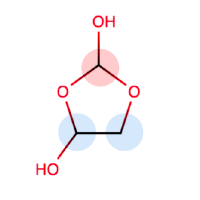Atom([ORtypes, ANDtypes, index, ring])
|
Atom representation, which may have some ORtypes and ANDtypes properties. |
Bond([ORtypes, ANDtypes])
|
Bond representation, which may have ORtype and ANDtype descriptors. |
addAtom(self, bondToAtom[, bondORtypes, …])
|
Add an atom to the specified target atom. |
asSMIRKS(self[, smarts])
|
Returns a SMIRKS representation of the chemical environment |
getAlphaAtoms(self)
|
Returns a list of atoms alpha to any indexed atom |
getAlphaBonds(self)
|
Returns a list of Bond objects that connect |
getAtoms(self)
|
- Returns
|
getBetaAtoms(self)
|
Returns a list of atoms beta to any indexed atom |
getBetaBonds(self)
|
Returns a list of Bond objects that connect |
getBond(self, atom1, atom2)
|
Get bond betwen two atoms |
getBondOrder(self, atom)
|
Returns minimum bond order around a given atom 0 if atom has no neighbors aromatic bonds count as 1.5 any bond counts as 1.0 |
getBonds(self[, atom])
|
- Parameters
|
getComponentList(self, component_type[, …])
|
Returns a list of atoms or bonds matching the descriptor |
getIndexedAtoms(self)
|
returns the list of Atom objects with an index |
getIndexedBonds(self)
|
Returns a list of Bond objects that connect two indexed atoms |
getNeighbors(self, atom)
|
Returns atoms that are bound to the given atom in the form of a list of Atom objects |
getType(self)
|
Uses number of indexed atoms and bond connectivity to determine the type of chemical environment |
getUnindexedAtoms(self)
|
returns a list of Atom objects that are not indexed |
getUnindexedBonds(self)
|
Returns a list of Bond objects that connect |
getValence(self, atom)
|
Returns the valence (number of neighboring atoms) around the given atom |
isAlpha(self, component)
|
Takes an atom or bond are returns True if it is alpha to an indexed atom |
isBeta(self, component)
|
Takes an atom or bond are returns True if it is beta to an indexed atom |
isIndexed(self, component)
|
returns True if the atom or bond is indexed |
isUnindexed(self, component)
|
returns True if the atom or bond is not indexed |
isValid(self[, smirks])
|
Returns if the environment is valid, that is if it creates a parseable SMIRKS string. |
removeAtom(self, atom[, onlyEmpty])
|
Remove the specified atom from the chemical environment. |
selectAtom(self[, descriptor])
|
Select a random atom fitting the descriptor. |
selectBond(self[, descriptor])
|
Select a random bond fitting the descriptor. |
validate(smirks[, ensure_valence_type, toolkit])
|
Validate the provided SMIRKS string is valid, and if requested, tags atoms appropriate to the specified valence type. |
 Open Force Field Toolkit
0.6.0
Open Force Field Toolkit
0.6.0